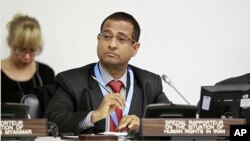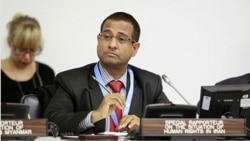In his latest report to the United Nations General Assembly, the Special Rapporteur on Human Rights in Iran, Ahmed Shaheed, says the Iranian regime is responsible for “deeply troubling” rights violations, many of which are “systemic in nature.”
The violations include the detention of journalists, writers and editors; the imprisonment of bloggers and internet users – four of whom -- Vahid Asghari, Amad Reza Hashempour, Mehdi Alizadeh Fakhrabad and Saeed Malekpour were sentenced to death in January; the execution of prisoners -– at least 223 people in the first six months of this year alone -– many after grossly unfair trials; the incarceration of human rights defenders for long periods of time in solitary confinement and without access to legal counsel, while subjecting many to physical abuse, including beatings, mock execution and rape.
Mr. Shaheed also reported on the persecution of religious minorities, including Christians, Baha’is and Gonabadi Dervishes; and ethnic minorities, including Arabs, Kurds and Azeris. He said that Iran’s Islamic Penal code contravenes international laws Iran has ratified, particularly in the case of discriminatory gender laws, and the vagueness of the charges of blasphemy and insult often levied against civil society activists. He called on the Iranian government to release all political prisoners and prisoners of conscience.
Mr. Shaheed’s report on Iran is the third he has prepared since the UN Human Rights Council created his mandate in March 2011 with strong support from the international community. The document will serve as the basis for a General Assembly resolution critical of Iran’s human rights abuses, which will likely be voted on in December.
The United States welcomes the report from the UN Special Rapporteur, which reinforces what the U.S. has been saying for a considerable time: Iran’s human rights record is atrocious and getting worse. In concert with Special Rapporteur Shaheed, the U.S. calls for the Government of Iran to immediately release all political prisoners and uphold its international treaty obligations.
As Secretary of State Hillary Clinton has said, “The United States joins the international community in affirming the universal rights to which all men and women – in Iran and around the world – are entitled.”
The violations include the detention of journalists, writers and editors; the imprisonment of bloggers and internet users – four of whom -- Vahid Asghari, Amad Reza Hashempour, Mehdi Alizadeh Fakhrabad and Saeed Malekpour were sentenced to death in January; the execution of prisoners -– at least 223 people in the first six months of this year alone -– many after grossly unfair trials; the incarceration of human rights defenders for long periods of time in solitary confinement and without access to legal counsel, while subjecting many to physical abuse, including beatings, mock execution and rape.
Mr. Shaheed also reported on the persecution of religious minorities, including Christians, Baha’is and Gonabadi Dervishes; and ethnic minorities, including Arabs, Kurds and Azeris. He said that Iran’s Islamic Penal code contravenes international laws Iran has ratified, particularly in the case of discriminatory gender laws, and the vagueness of the charges of blasphemy and insult often levied against civil society activists. He called on the Iranian government to release all political prisoners and prisoners of conscience.
Mr. Shaheed’s report on Iran is the third he has prepared since the UN Human Rights Council created his mandate in March 2011 with strong support from the international community. The document will serve as the basis for a General Assembly resolution critical of Iran’s human rights abuses, which will likely be voted on in December.
The United States welcomes the report from the UN Special Rapporteur, which reinforces what the U.S. has been saying for a considerable time: Iran’s human rights record is atrocious and getting worse. In concert with Special Rapporteur Shaheed, the U.S. calls for the Government of Iran to immediately release all political prisoners and uphold its international treaty obligations.
As Secretary of State Hillary Clinton has said, “The United States joins the international community in affirming the universal rights to which all men and women – in Iran and around the world – are entitled.”






